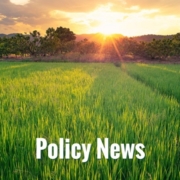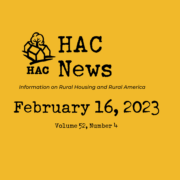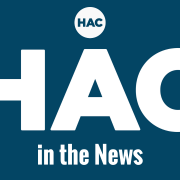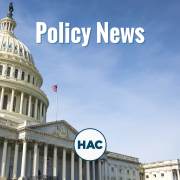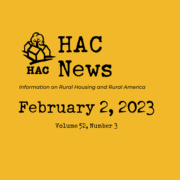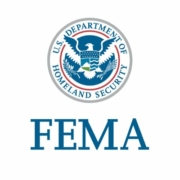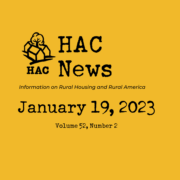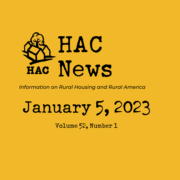TOP STORIES
Buy America requirements take effect February 4 for USDA multifamily housing, site development, and community facilities programs
On January 23, USDA Rural Development issued a stakeholder announcement saying that after February 3 “all non-Federal organizations receiving RD financial assistance for infrastructure projects will be required to exclusively use iron, steel, manufactured products and construction materials manufactured in the United States” under the Build America, Buy America Act. In September an RD document stated that the Rural Housing Service programs covered by the law are “Rural Housing Site Loans and Self-Help Housing Land Development Loans, Rural Rental Housing Loans, Section 538 Rural Rental Housing Guaranteed Loans, The RD Multi-Family Housing Revitalization Demonstration Program (MPR), and Community Facilities Loans and Grants (Includes Guarantees, Emergency Rural Health Care Grants and Tribal College Initiatives Grants).” For more information, email USDA staff, SM.RD.babaa.inquiry@usda.gov.
Budget request to be released March 9
Development of federal funding levels for fiscal year 2024 – which starts October 1, 2023 – will begin on March 9 when the Biden-Harris administration publishes its budget request. HAC will post information on our website that day.
White House announces renter protections
The Biden-Harris administration on January 25 announced several actions to protect renters, to be undertaken by the Federal Trade Commission, Consumer Financial Protection Bureau, Federal Housing Finance Agency, Department of Justice, and HUD. The administration also issued a Blueprint for a Renters Bill of Rights and launched a Resident-Centered Housing Challenge. The challenge calls on providers and other stakeholders to sign up to improve renters’ quality of life. For more information on the challenge, email White House staff, RCHousingChallenge@who.eop.gov.
RuralSTAT
From June 2020 to June 2022, expenses for rural households rose by 18.5%, while earnings grew by only 6.1%. Urban residents’ expenses rose by 14.5% and their earnings increased by 8.6%. Source: Iowa State University Extension and Outreach.
OPPORTUNITIES
Rental preservation grants available
Preservation of affordable rental housing is the theme for TD Bank’s 17th annual Housing for Everyone competition. Nonprofit organizations in specific geographic areas are eligible for grants of $150,000-$250,000 to rehabilitate property, provide rental assistance funds, or increase organizational capacity. The deadline is February 14. For more information, register for a February 7 webinar or email US-CharitableGiving@TD.com.
Competition opens for veterans case management funds
VA’s Homeless Providers Grant and Per Diem Program Case Management Grant program offers two-year funding to nonprofits and state, local, or Tribal governments to provide case management services to support veterans in acquiring and maintaining permanent housing. Applications are due May 4; information should be available online on February 3. For more information, contact Chelsea Watson, VA, 727-273-5619.
Eligibility expanded for hazard mitigation revolving loan funds
FEMA’s new Safeguarding Tomorrow Revolving Loan Fund grant program has been expanded, allowing American Samoa, Guam, Northern Mariana Islands, and U.S. Virgin Islands – as well as states, D.C., and Puerto Rico – to apply for grants to capitalize revolving loan funds for resilience-related activities. Twenty Tribal Nations are now eligible to receive funds directly from FEMA, and all federally recognized Tribes are eligible to get this funding through a state. The application process opened on February 1. For more information, contact FEMA staff, askcsid@fema.dhs.gov.
Grants offered for rural arts
The Rural Arts Initiative of the Laura Jane Musser Fund offers grants of up to $12,000 to assist small nonprofit arts organizations in rural communities to develop, implement, or sustain exceptional artistic opportunities for adults and children in the areas of literary, visual, music, and performing arts. Applicants must be located in communities with under 20,000 population in Colorado, Hawaii, Wyoming, or specified parts of Minnesota, New York, or Texas. Applications must be submitted online between February 8 and March 8. For more information, contact the Musser Fund, 612-825-2024.
REGULATIONS AND FEDERAL AGENCIES
Agencies request comments on several programs
- Section 502 guaranteed loans: Comments are due March 28 on changes to the use of special servicing options for non-performing loans. For more information, contact Ticia Weare, USDA, 314-679-6919.
- Section 538 priorities: Comments are due April 3 on a proposal to remove from regulations the list of project types that receive priority for Section 538 rental housing loans, allowing USDA to establish new priorities without going through the regulatory process. For more information, contact Tammy Daniels, USDA, 202-720-0021.
- Section 306C water and waste program for colonias and Tribes: Comments are due April 3 on revisions to the Section 306C Water and Waste Disposal Grants program, renamed the Water and Waste Facility Loans and Grants to Alleviate Health Risks program. For more information, contact Charles Stephens, USDA, 202-619-8500.
- ReConnect program: Comments are due March 31 on changes to the Rural Utilities Service’s Rural eConnectivity (ReConnect) broadband program. For more information, contact Laurel Leverrier, USDA, 202-720-9556.
- Tribal housing counselors: Comments are due March 27 on a proposed housing counselor certification option for employees of Tribes, Tribally Designated Housing Entities, and other Tribal entities. For more information, contact David Valdez, HUD, 713-718-3178.
- Section 8: Comments are due April 3 on a HUD proposal to develop a single Section 8 project-based rental assistance program regulation consisting of a standardized set of Section 8 program requirements and to create a single renewal contract form. For more information, contact Jennifer Lavorel, HUD, 202-402-2515.
- Data on race/ethnicity: Comments are due April 12 on the first revisions since 1997 to the Office of Management and Budget’s policy directive that provides standards for all federal agencies on maintaining, collecting, and presenting federal data on race and ethnicity. For more information, contact Bob Sivinski, OMB.
- Government Auditing Standards: Comments are due April 28 to the Government Accountability Office on proposed revisions to the Government Auditing Standards (GAGAS), also known as the Yellow Book. For more information, contact Cecil Davis, GAO, 202-512-9362.
Final rule will affect rental housing under many HUD programs
HUD has posted a preview version of a final rule implementing provisions of the Housing Opportunity Through Modernization Act of 2016 that make changes impacting HUD-assisted rental housing, particularly income calculations and reviews. Some provisions will take effect 30 days after publication in the Federal Register and others on January 1, 2024. Contacts for further information vary by program and are listed in the rule.
Staffing changes coming at USDA
USDA Deputy Secretary Jewel Bronaugh has announced she will leave the department. Nancie-Ann Bodell, the Rural Housing Service’s Deputy Administrator for Multifamily Housing, will leave her position February 28. Cathy Glover, Deputy Administrator for Single-Family Housing, is retiring this year. Chad Parker, Deputy Administrator for Community Facilities, retired at the end of December; Joseph Ben-Israel, the Assistant Deputy Administrator, is Acting Deputy Administrator.
Duty to Serve plan modifications posted
Final modifications to Fannie Mae’s and Freddie Mac’s Duty to Serve plans have been released by the Federal Housing Finance Agency. Freddie Mac had proposed to delete the objective of purchasing loans to preserve Section 515 properties, but its final document keeps that item intact. For more information, email DutyToServeStakeholders@fhfa.gov.
EVENTS
HAC schedules second webinar on affordable housing and substance use recovery
Providing support for successful recovery and addressing the substance use disorder epidemic requires a collaborative cross-sector approach. Join HAC on February 15 as we host “Affordable Housing and Recovery Cross-Sector Collaborative Conversation” with professionals from criminal justice, behavioral and mental health, and housing discussing ways to support recovery in rural communities. Registration information will be posted on HAC’s site when available. An earlier webinar and a resource guide are also available from HAC.
Webinar will address federal funding
A February 10 webinar on FY23 Federal Funding & Outlook for FY24 will feature speakers from HAC and other members of the Campaign for Housing and Community Development Funding, covering HUD’s and USDA’s affordable housing, community development, and homelessness programs.
Rural recreation communities’ housing to be featured
A webinar titled Housing Solutions in Rural Recreation Communities will be offered February 15 by USDA RD, HUD, and EPA. The session will highlight federal resources and private sector strategies that help communities leverage their outdoor recreation and tourism venues to address housing solutions and improve economic resilience.
HAC
HAC seeks Portfolio Manager Associate (new!) and Portfolio Manager, Closing and Disbursements
- The Portfolio Management Associate is an entry-level position and will assist in a range of lending activities including closing, disbursement, monitoring, and servicing single- and multifamily housing development loans. This position is eligible for telecommuting.
- The Portfolio Manager, Closing and Disbursements is responsible for all aspects of loan closing and loan disbursements for an assigned portfolio of loans made to entities engaged in affordable housing activities in rural communities throughout the United States. This position is eligible for telecommuting.
Need capital for your affordable housing project?
HAC’s loan fund provides low interest rate loans to support single- and multifamily affordable housing projects for low-income rural residents throughout the U.S. and territories. Capital is available for all types of affordable and mixed-income housing projects, including preservation, new development, farmworker, senior and veteran housing. HAC loan funds can be used for pre-development, site acquisition, site development, construction/rehabilitation and permanent financing. Contact HAC’s loan fund staff at hacloanfund@ruralhome.org, 202-842-8600.
Please note: HAC is not able to offer loans to individuals or families. Borrowers must be nonprofit or for-profit organizations or government entities (including tribes).
Want to reprint a HAC News item?
Please credit the HAC News and provide a link to HAC’s website. Thank you!

